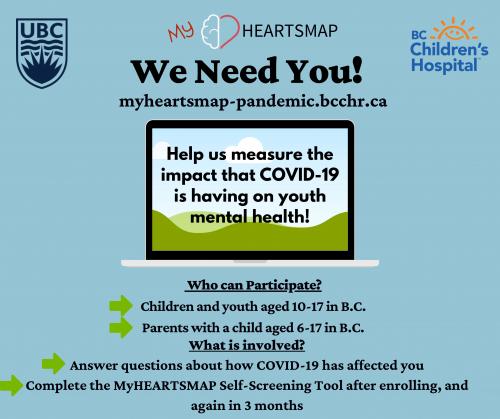The pandemic has taken a toll on everyone these past few months but physical distancing measures, school closures and other disruptions to daily life can be particularly challenging for young people.
 To better support kids and teens during this time, BC Children’s researchers have launched a new study to assess the impact of the COVID-19 pandemic on children’s mental health.
To better support kids and teens during this time, BC Children’s researchers have launched a new study to assess the impact of the COVID-19 pandemic on children’s mental health.
“Though some schools may be reopening soon, many children may have spent the summer separated from their friends or extended family,” said Dr. Quynh Doan, pediatric emergency physician and lead researcher on the study.
“This study will help us find out how we can better allocate mental health resources to meet the needs of the province's youth.”
Click here to participate in the study.
Using MyHEARTSMAP, a validated online mental health screening instrument, the researchers aim to identify how often children and youth are having mental health concerns during the pandemic, how severe these concerns are, and how best to connect families with helpful resources and support services.
MyHEARTSMAP is adapted from HEARTSMAP, an electronic, clinical assessment tool developed at BC Children’s to improve care for children and youth presenting to the emergency department (ED) with a mental health concern. The tool was designed by the Doan research group and has been in use at BC Children’s Hospital pediatric emergency department (PED) since 2015 and implemented in emergency departments across BC.
The study is looking for families to participate and help measure how much and in what manner the pandemic has affected the social and psychological wellness of the province’s children and youth.
“We need parents across the province to help us improve mental health resources by participating in this study,”
says Dr. Doan. “Taking part is simple and straightforward and only takes about 30 minutes.”
The study is designed for BC children aged 10-17 or parents of children aged 6-17 (children need to be at least ten years old to use MyHEARTSMAP). Once enrolled in the study, participants will answer questions about how COVID-19 has affected them and then complete the MyHEARTSMAP self-screening tool. They will then complete the tool once again three months later.
Click here to participate in the study.





